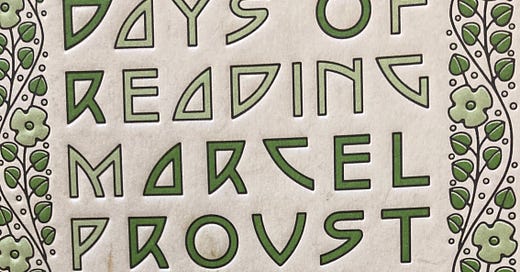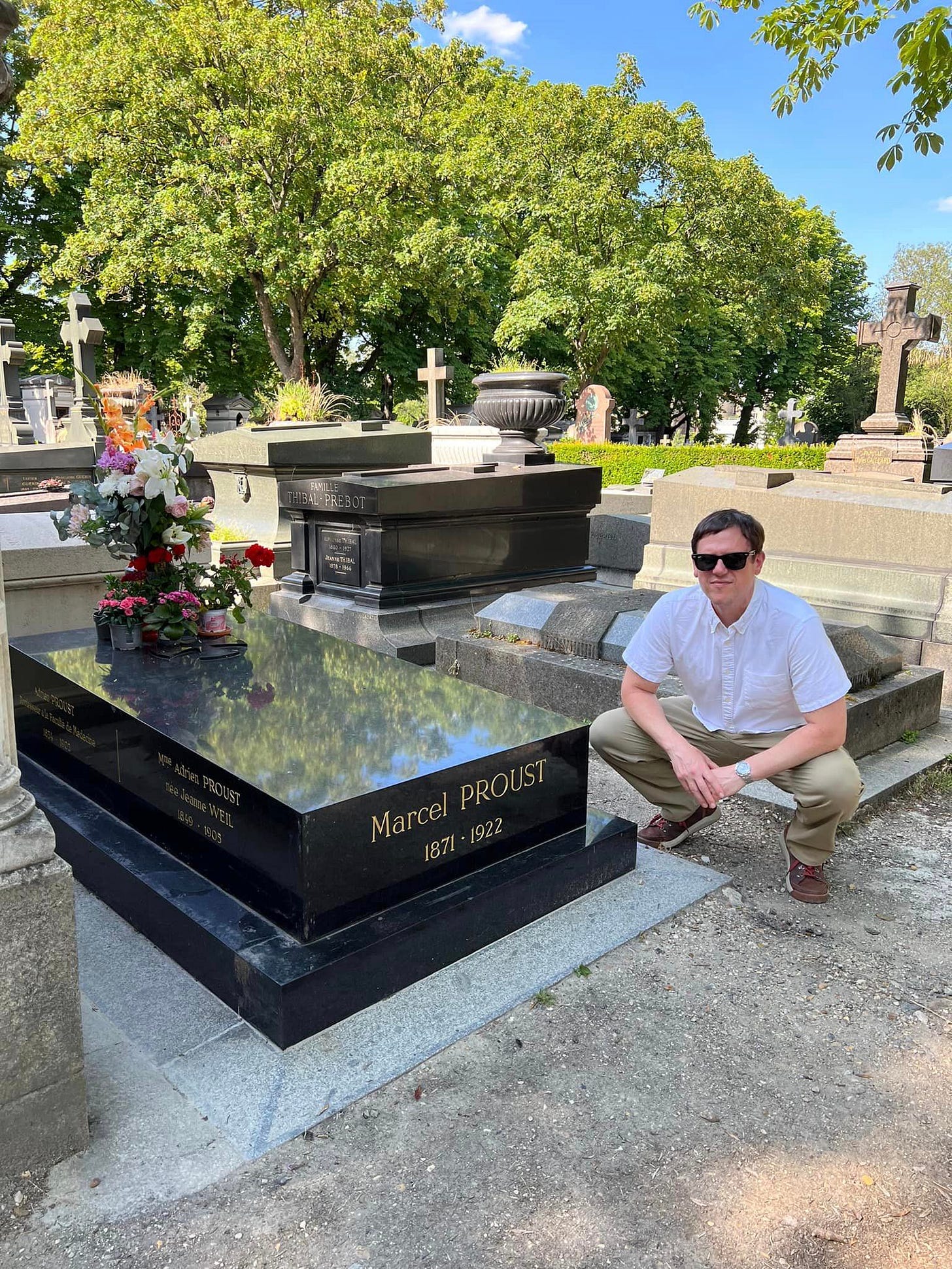This time last year I was on a sweltering bus rumbling along the Seine with Meredith.
By the time we go to our destination, Pere Lachaise, the famed Parisian cemetery, we were drenched.
I was already nervous. We’d come to France from Michigan so I could pay my respects to Marcel Proust. I’d spent the past three years listening to him tell me his stories each morning in his droll yet lofty voice, jumping from gossip to metaphysics to dreams to heraldry – about Swann and Odette, about his childhood, about the Les Champs Elysees and Gilberte, about Balbec and Albertine, about growing up, the scandals of the Baron, about Paris and the foppish dukes and duchesses he both admires and admonishes equally.
Proust is the master of exploring the spaces in between everything else. Every gesture and manner of speech and historical factoid he has ever studied comes surging out in his famously long sentences.
I tried reading Search several times over the years, but I could never get fully immersed into the books until the pandemic. It took me three years to read all seven novels. They left me thinking that our own lives are the greatest works of art if we can find them through the misty imperfections of memory and time.
But I’m still not ready to dissect and talk about Search. I may need to read the whole thing again before I do that. I’m also not ready to launch fully into the Parisian pilgrimage.
But I still want to mark the year anniversary of our trip in some way, so instead I’ll spend some time here discussing a short book essays and extracts, Days of Reading, that I read recently. The main pieces were meant to introduce his French translations of English art critic John Ruskin, whom Proust loved.
But Proust can’t write a standard introduction. I’m not sure he was able to do anything conventional. Instead, the introductions say more about Proust and his world than Ruskin in the same way that, I once read, Henry Miller’s book about Rimbaud is more about Henry Miller than it is about Rimbaud.
(And perhaps this short essay is more about me than it is about Proust).
On the surface, Marcel and I have very little in common – Marcel = closeted gay, half Jewish, asthmatic, hypochondriac, monied, wealth-obsessed, aristocracy-obsessed. Me = none of those things.
He mostly wrote fancy people with a lot of money. I generally write about broke, Midwestern American bumpkins.
But where we meet is a love of books, ideas and art.
“There are no days of my childhood which I lived so fully perhaps as those I thought I had left behind without living them, those I spent with a favourite book,” Proust says. (Pg 49)
I also loved to disappear as a child — into a book, into playtime, into sports, into cartoons, into music. Here’s Proust talking about how fresh surroundings can help him escape into the “heart of the non-self.”
“For myself, I only feel myself live and think in a room where everything is the creation and language of lives profoundly different from my own, of a taste the opposite of mine, where I can rediscover nothing of my conscious thought, where my imagination is exhilarated by feeling itself plunged into the heart of the non-self…” (Pg 58)
We can only absorb what a book offers in this kind of solitude. It’s not a conversation. A book isn’t a friend. It’s something different.
“In the notes which I have added to this volume I have tried to show that reading cannot be assimilated in this way to a conversation, even with the wisest of men; that the difference essentially between a book and a friend lies not in their greater or lesser wisdom, but in the manner in which we communicate with them, reading being the reverse of conversation, consisting as it does for each one of us in receiving the communication of another’s thought while still being on our own, that is, continuing to enjoy the intellectual sway which we have in solitude and which conversation dispels instantly, and continuing to be open to inspiration, with our minds still at work hard and fruitfully on themselves.” (Pg 67)
Books even have a medicinal purpose. I will note Proust’s father was a famed doctor.
“There are certain cases, however, certain as it were pathological cases of spiritual depression, when reading may become a sort of healing discipline and be entrusted, by way of repeated incitements, with reintroducing a lazy mind perpetually into the life of the spirit. Then books play a role for it analogous to that of psychotherapists for certain cases of neurasthenia.” (Pg 72)
In journalism we like to say, “Don’t get lost in the weeds.” But Proust revels in the weeds, the thickest of the thickets, where everything comes to life, even the things in between the things.
I particularly enjoyed a quip he makes when discussing poet-novelist-journalist Theophile Gautier’s travel book Voyages en Espangne, and how the writer’s personality comes through in his buoyant sentences.
“One certainly has the sense that his cheerful bragging like his fits of melancholy were in his case the somewhat unbuttoned habits of the journalist.” (Pg 84)
“Cheerful bragging,” “fits of melancholy” and “unbuttoned habits” sounds like pretty much every journalist I’ve ever met.




